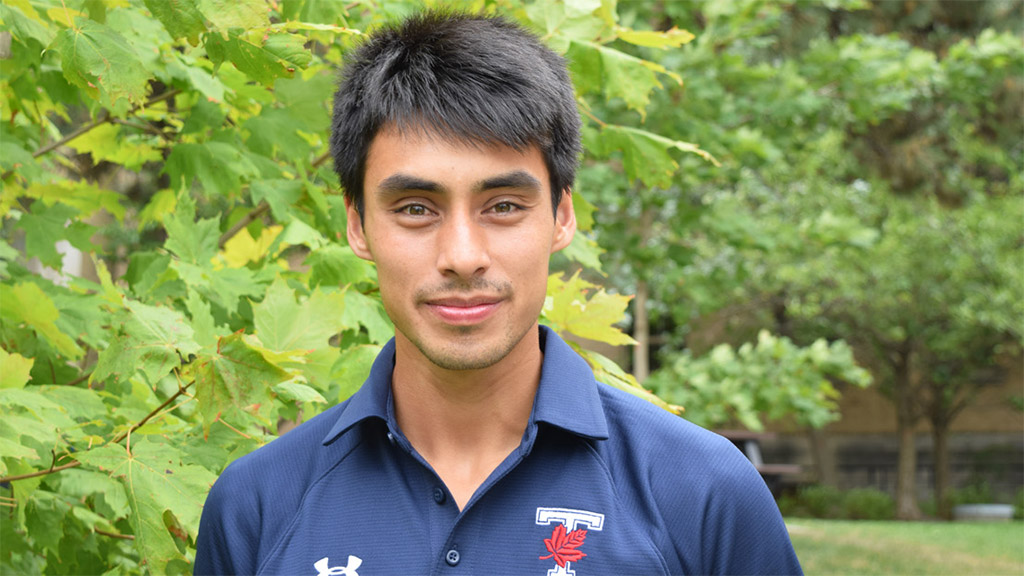Stroke for stroke: How Rui Xu manages his PhD project while being a varsity rower
The word focused surfaces frequently when talking to, or about, Rui Xu. Supervised by Dr. Meaghan O’Reilly, a scientist in Physical Sciences at Sunnybrook Research Institute and the Canada Research Chair in Biomedical Ultrasound, his work revolves around focused ultrasound. He is designing software and hardware to enhance the technology’s therapeutic effect for diseases of the spinal cord. “These diseases often aren’t treatable using drugs because there’s a barrier between the spinal cord blood vessels and the spinal cord nerves. If we can temporarily open that barrier, then we can potentially improve treatment,” the PhD student says.
When discussing another of Xu’s passions, focused is a fitting word to use. He trains 10 times per week as a member of the University of Toronto Varsity Blues rowing team. Depending on the season, his alarm rings out at 4 a.m. so he can row from 5:30 to 7 a.m.; he bikes to Sunnybrook, where he works on his PhD from 8 a.m. to 4 or 5 p.m.; he darts to U of T’s St. George campus for a land practice; and then he races home, where he devours dinner and rushes to bed to do it all again the next day. “Rowing is one of the best sports I can do in Toronto to maximize my athletic potential. I don’t want to look back later and regret missing out on opportunities that come with having good physical abilities,” he says.
Here, Xu chats with Matthew Pariselli about how rowing has benefited his PhD project, what it has in common with research and why he rarely has a bad day.
What is the purpose of rowing in your life?
It provides balance. I spend a fair amount of time on it, but not nearly as much time as I spend working on my PhD. I find it’s a good way to wake up in the morning, to get myself mentally prepared to come to work. I row, burn off a whole bunch of energy, and then I’m calm. I bike to work, and on my ride I usually think about what I need to do, what I need to accomplish in the lab. After, I try to keep the work at work. My second practice is not to forget about work, but to help me calm down, go home and go back to sleep [laughs].
What challenges do you encounter as a student athlete?
One of the biggest challenges is sleep. I’ve almost become a bit selfish about it. There are a few occasions where I’ll go out past 8 p.m. If someone’s defending their PhD and they’re having a party afterwards, I’ll stay out until 9 p.m. [laughs]. I find that if I get less than seven hours of sleep, then both rowing and academics start to slip. I can’t sleep in, and ideally, I’m not sleeping at my desk [laughs], so finding time to sleep and row and do research leaves little time for socializing outside of those circles.
What has rowing taught you that you draw on in research?
Balancing rowing and my PhD has taught me optimization. I need to figure out the best way to cook food quickly, fall asleep quickly and sleep an efficient amount, get to and from work, and make good use of my time. Rowing has taught me how to optimize in many different ways, and I think that adds a different perspective to thinking about how I can solve a problem or how I can improve a code at work.
What similarities exist between rowing and research?
One I can think of is when I’m writing a paper and the first draft starts out pretty rough, but we continuously refine it, continuously smooth it out. In many ways, that’s like trying to put a big boat together. You have eight people rowing differently and it’s very rough. It doesn’t feel good, and it doesn’t look good either [laughs]. The coaches and athletes will refine how we work together so that the end product, which is ideally what we demonstrate in a race, looks good and goes fast. In terms of a paper, that’s what gets published. It’s always a project where you try to improve things from stroke to stroke, or from day to day in the lab.
How has rowing helped you to manage your PhD?
Since I started rowing, I’ve found it’s extremely rare to have a bad day. Part of the day might be bad—maybe I have an experiment that doesn’t go well—but then it’s bookended by exercises that probably go quite well. On the whole, I very rarely have a bad day, and that really helps with coping, from a stress perspective. When at least one thing goes well every day, then you can go to sleep thinking, ‘It’s been a decent day.’ You can start again tomorrow.
Would you suggest exercise to someone who’s starting a PhD?
For sure. One thing rowing, or activity in general, helps with is setting up a routine. If you set aside an hour every morning [to exercise] before you leave for work, then it’s quite easy to get it done so you don’t have to stress about it for the rest of the day. I like consistency. I like having two workouts I’m going to do every day. It sets up when I’m going to eat my meals, when I’m going to get ready for bed and when I’m going to wake up. It helps to organize my day. By having an organized day, then I can get more done. I’d recommend it.



